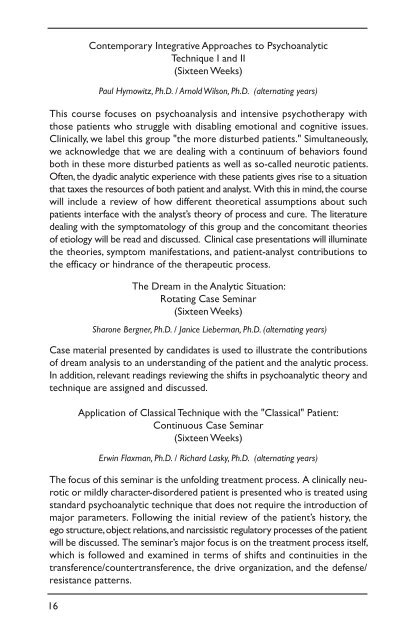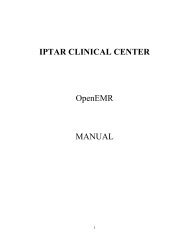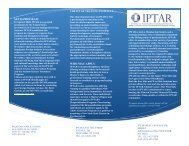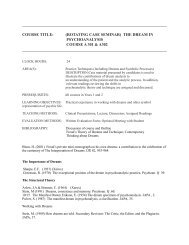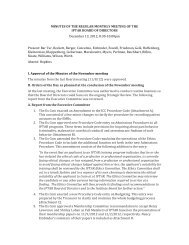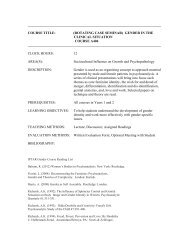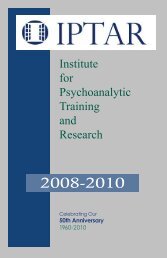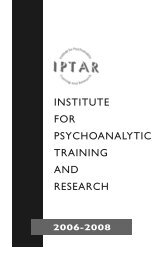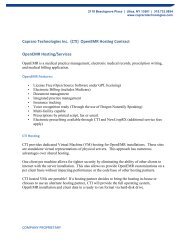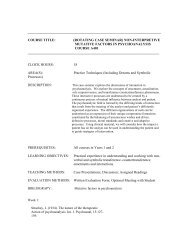IPTAR Bulletin - Institute for Psychoanalytic Training and Research
IPTAR Bulletin - Institute for Psychoanalytic Training and Research
IPTAR Bulletin - Institute for Psychoanalytic Training and Research
Create successful ePaper yourself
Turn your PDF publications into a flip-book with our unique Google optimized e-Paper software.
16<br />
Contemporary Integrative Approaches to <strong>Psychoanalytic</strong><br />
Technique I <strong>and</strong> II<br />
(Sixteen Weeks)<br />
Paul Hymowitz, Ph.D. / Arnold Wilson, Ph.D. (alternating years)<br />
This course focuses on psychoanalysis <strong>and</strong> intensive psychotherapy with<br />
those patients who struggle with disabling emotional <strong>and</strong> cognitive issues.<br />
Clinically, we label this group "the more disturbed patients." Simultaneously,<br />
we acknowledge that we are dealing with a continuum of behaviors found<br />
both in these more disturbed patients as well as so-called neurotic patients.<br />
Often, the dyadic analytic experience with these patients gives rise to a situation<br />
that taxes the resources of both patient <strong>and</strong> analyst. With this in mind,the course<br />
will include a review of how different theoretical assumptions about such<br />
patients interface with the analyst’s theory of process <strong>and</strong> cure. The literature<br />
dealing with the symptomatology of this group <strong>and</strong> the concomitant theories<br />
of etiology will be read <strong>and</strong> discussed. Clinical case presentations will illuminate<br />
the theories, symptom manifestations, <strong>and</strong> patient-analyst contributions to<br />
the efficacy or hindrance of the therapeutic process.<br />
The Dream in the Analytic Situation:<br />
Rotating Case Seminar<br />
(Sixteen Weeks)<br />
Sharone Bergner, Ph.D. / Janice Lieberman, Ph.D. (alternating years)<br />
Case material presented by c<strong>and</strong>idates is used to illustrate the contributions<br />
of dream analysis to an underst<strong>and</strong>ing of the patient <strong>and</strong> the analytic process.<br />
In addition, relevant readings reviewing the shifts in psychoanalytic theory <strong>and</strong><br />
technique are assigned <strong>and</strong> discussed.<br />
Application of Classical Technique with the "Classical" Patient:<br />
Continuous Case Seminar<br />
(Sixteen Weeks)<br />
Erwin Flaxman, Ph.D. / Richard Lasky, Ph.D. (alternating years)<br />
The focus of this seminar is the unfolding treatment process. A clinically neurotic<br />
or mildly character-disordered patient is presented who is treated using<br />
st<strong>and</strong>ard psychoanalytic technique that does not require the introduction of<br />
major parameters. Following the initial review of the patient’s history, the<br />
ego structure,object relations,<strong>and</strong> narcissistic regulatory processes of the patient<br />
will be discussed. The seminar’s major focus is on the treatment process itself,<br />
which is followed <strong>and</strong> examined in terms of shifts <strong>and</strong> continuities in the<br />
transference/countertransference, the drive organization, <strong>and</strong> the defense/<br />
resistance patterns.<br />
YEAR FOUR<br />
In this year, c<strong>and</strong>idates are given the opportunity to integrate the many complex,<br />
<strong>and</strong> at times conflicting, theories of mental functioning <strong>and</strong> approaches<br />
to analytic work they have studied in previous years. One can<br />
consolidate one’s own views with regard to these issues through further study<br />
<strong>and</strong> deep immersion in clinical work. The particular challenges of working<br />
with the more disturbed patient, integrating new thinking about gender, <strong>and</strong><br />
confronting countertransference issues are emphasized. This year facilitates a<br />
sense of closure without minimizing the ongoing challenges facing analysts<br />
today. This final year of <strong>for</strong>mal coursework prepares c<strong>and</strong>idates to study<br />
<strong>and</strong> to grow independently in the years ahead. It does not complete their education,<br />
but readies them to work independently on these issues in the same<br />
way in which analysis prepares patients to keep on growing after the <strong>for</strong>mal<br />
procedure comes to an end.<br />
Comparative Models I <strong>and</strong> II<br />
(Twelve Weeks)<br />
Steven Ellman, Ph.D.<br />
This course compares different theoretical models that have been studied<br />
during the first three years of training. The goal is to integrate some aspects<br />
of these theories within a Freudian framework. The models that we discuss<br />
include the Kleinian,Winnicottian, <strong>and</strong> relational perspectives.<br />
Non-Interpretive Mutative Factors in Psychoanalysis<br />
(Twelve Weeks)<br />
Ken Feiner, Psy.D. / Gil A. Katz, Ph.D. (alternating years)<br />
This case seminar explores the concepts of projective identification, actualization,<br />
role-responsiveness, <strong>and</strong> transference-countertransference enactment. These<br />
unconscious <strong>and</strong> non-verbalized interactions are understood as compromise<br />
<strong>for</strong>mations in which unconscious fantasies, resistance, transference, <strong>and</strong><br />
counter-transference are played out. The communicative <strong>and</strong> mutative contribution<br />
made by these processes is explored along with the advantages <strong>and</strong><br />
drawbacks of various interventions.<br />
17


